First Responders: Northern Michigan Women on the Front Lines
Oct. 30, 2015
Every day across northern Michigan, women in life-saving positions — including firefighters, EMTs, 911 dispatchers and other first responders — respond to the call of duty to provide aid and assistance to fellow citizens in need. The Northern Express profiles four women serving their communities on the front lines.
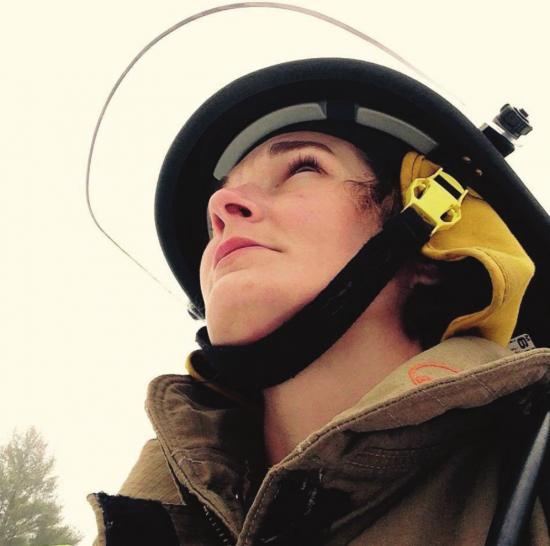
Nichole Weeks
Firefighter: Fife Lake/Station 6, Grand Traverse Rural Fire Department
Fife Lake resident and 35-year-old mother of four Nichole Weeks represents the fourth generation of firefighters in her family. But unlike her male predecessors, Weeks is in the minority within her department — one of only two women in her training school of 19 students, and part of a small contingency of active female firefighters across northern Michigan.
“It is a very physically demanding job,” said Weeks, who works out of Grand Traverse Rural Fire Department’s Station 6 in Fife Lake. “I have all the same responsibilities as any other firefighter. We invested over 800 hours in our training. They challenged us (female candidates) to make sure we’re physically and mentally capable of handling the environment and work.”
Female firefighters are held to the same physical standards as men in the field, required to haul heavy hoses and equipment and operate in gear weighing 80+ pounds. Those able to pass the training must often navigate a male-dominated culture prevalent in most departments. “When you’re the only woman in the room, people do stare at you,” acknowledged Weeks, adding that male and female firefighters often approach the job with “very different” mentalities and skillsets. “You definitely stand out. It can be very challenging.”
But Weeks said she has earned the respect of her male peers by dedicating herself to her work, “proving who I am and what I’m capable of.” In a field marked by life-ordeath situations — where “every time you go out, no matter how safe you try to be, you risk not coming home to your family” — firefighters develop a bond akin to a “sisterhood and brotherhood.”
Emotional as well as physical demands are part of the job, according to Weeks. “It’s always devastating to see a house burning and a family standing there, and you’re trying to save one thing they can hold on to,” she said. “Any time you go out on a call, you never know what you’ll be walking into or dealing with. You hope it’s going to have a good possible outcome, but it doesn’t always.”
Yet despite the drawbacks and risks, Weeks highlights the rewards of serving on the force. As a firefighter, she’s actively engaged in the community, able to assist others in times of crisis, and is a role model for local children she meets during school outreach sessions, as well as her own kids.
“Your size or age doesn’t matter, or if you’re a woman,” said Weeks, who hopes to one day pursue wildland fire training out West. “If you can put yourself in the right mindset, and train and work as hard as any man, you’re entitled to that position.”
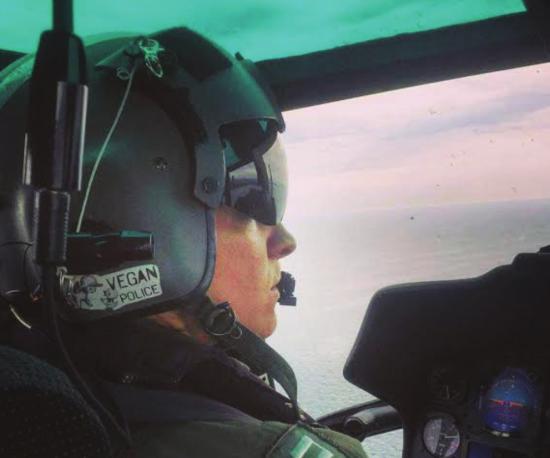
Lt. Katherine Pelkey
Helicopter Pilot: U.S. Coast Guard Air Station Traverse City
During the historic Aug. 2 storm that wreaked havoc on northern Michigan, two brothers were kayaking near the Manitou Islands when the front hit. After becoming separated, one of the men made it to land and reported his 33-year-old brother was missing out in the open water. U.S. Coast Guard crews were dispatched. The situation was urgent: The man’s likely survival hinged on being located before dark.
Just as dusk was setting in, the air crew spotted the kayaker in the water. Suffering from hypothermia after six hours adrift in Lake Michigan, the man was rescued and transferred to awaiting EMS. Among his rescuers:
33-year-old Lieutenant Katherine Pelkey, a helicopter pilot trained for exactly these types of life-saving search-and-rescue missions.
“(The kayaker) was way, far away from land when we found him,” recalled Pelkey. “It was cold, he was hypothermic and it was right at sunset. If we hadn’t found him, he likely wouldn’t have lasted long.”
The rescue embodies what Pelkey finds most fulfilling about her career. “Being the difference between someone surviving and not is pretty rewarding,” she said.
As a U.S. Coast Guard helicopter pilot, Pelkey’s day-to-day duties are diverse. Rescue missions are a key responsibility, but so are operations including coastal security, marine environmental protection, drug interdiction, defense readiness, navigational assistance and ice operations. Certified as a first pilot, Pelkey can both fly solo as well as with another pilot, swapping duties between flying and controlling communications and navigation.
Pelkey came to the Coast Guard at 24 years old with a business degree, looking to switch gears and pursue a “more humanitarian career.” First stationed in St. Ignace and Cheboygan, she’s served the last three years in Traverse City. Her husband is also in the Coast Guard; the couple have a two-year-old daughter. On top of working to achieve a career-family balance — “extremely challenging” at times, Pelkey acknowledged — the pilot also faces cultural obstacles common to many military women.
“One of the big challenges is that when men are used to dealing with other men, they’re used to solving problems the same way,” Pelkey explained. “As the only female pilot here…I’ve run into the issue where I’ll say something, and it’s almost like no one’s heard me, or I’ll be completely talked over. Or a male will repeat something I’ve already said, and then it’ll be (recognized as) a good idea.”
Pelkey is part of a group helping to organize a women’s conference for the district to address some of those barriers for female recruits. “I know right now the military in general is really looking at this problem,” she said. “Retention is an issue.”
Pelkey hopes more women will make it to front-line Coast Guard positions, citing the educational and training advantages it provides. She herself plans to continue pursuing those opportunities. “I’d like to do another operation four-year flying tour, apply for the advanced education program and go to law school through the Coast Guard,” she said.
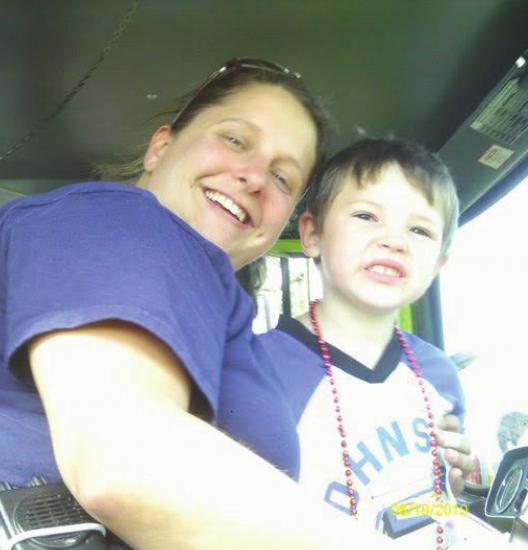
Nikki Booth
EMT/EMS Captain: Otsego Lake Township Fire Department
For 43-year-old Nikki Booth, working in emergency services is something of a family tradition. The Gaylord resident and EMT/ EMS Captain for the Otsego Lake Township Fire Department has had the opportunity to work with both her father, a firefighter, and her brother-in-law, a chief, at various points in her career. “I got into (the field) about 10 years ago, but I guess I’ve always been around it, because of my dad,” Booth said. “He’s done this his entire life.”
Yet as co-workers — familial or otherwise — have come and gone, it’s the work itself that’s rooted and sustained Booth in her position. “It’s not who I work with…and it’s not the money, which isn’t much,” she chuckled. “It’s what I do. I just love what I do so much.”
In addition to coordinating EMS trainings for her department, Booth is often one of the first responders on the scene of local emergencies, aiding everyone from elderly heart attack victims to injured drivers in horrific multi-car accidents. The work requires Booth to stay steely calm, focused and ready for “almost any” traumatic situation that could arise.
“That’s where your training comes into play…and why we continue to train together as a team on a monthly basis, so it becomes second nature when you’re on the scene,” said Booth. “You never know what you’re getting into when you head out. Sometimes it’s pretty dire. But the more you do it, the better you get at taking control of your emotions and focusing on the job that needs to be done.”
One call that vividly stands out in Booth’s mind involved two little girls who were on a sledding hill and slammed into a tree. “They both had head wounds…it was serious, they had to be taken out of the area for assistance,” said Booth. “Sometimes we don’t always know what happens with our patients. They go off in an ambulance, our job is done and we don’t know what happens. But later, those little girls came back to the fire hall with their families…and thanked us for what we did. That was very rewarding, to see a good outcome from that.”
The rewarding nature of EMT work is one reason Booth — who like many in the field, also works a day job as a medical assistant — is passionate about recruiting others into training. “Right now the most challenging aspect is getting people to sign up and help,” she said. Just three EMTs at Booth’s department are available to respond to calls; when an alert goes out, whoever can respond heads to the scene — though sometimes calls can be missed if no one is available.
“I don’t think enough people out there know this may be an option for them,” Booth said. “You don’t have to have a specific background. You can come in almost off the street, and we’ll get you the training you need.” Booth encourages people considering a career change, interested in learning a new skill or seeking a public service opportunity to consider EMT training. “Helping out the community and taking care of the public… it’s just very rewarding,” she said.
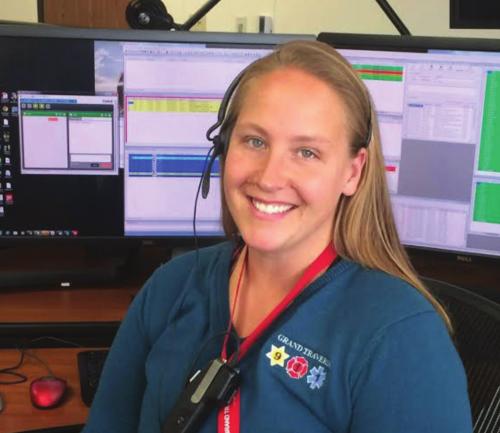
Leah Hornacek
Dispatch Supervisor: Grand Traverse County 911/Central Dispatch
As a dispatch supervisor for Grand Traverse County 911/Central Dispatch, 33-year-old Leah Hornacek doesn’t come face-to-face with trauma victims. She doesn’t set foot on the scene of a car accident, or run up the driveway of a blazing home. Hornacek’s husband — a sheriff’s deputy, whom she herself dispatches to emergencies — encounters those scenarios, and his stories have been enough to convince her it’s not her desired line of work.
What Hornacek does do, however, is equally critical: She’s the first voice to answer the cry for help in every one of the above scenarios. “Part of my job is being the first person someone contacts when they truly need help…many times, in one of the worst moments of their lives,” she said.
Working in 12-hour shifts — overnight, on weekends, on every major holiday – dispatchers respond to a continuous stream of panicked calls of distress. Trained to stabilize their own emotions as they help victims navigate traumatic, often life-threatening situations, first responders in the 911 call center are tasked not only with administering aid over the phone to callers, but simultaneously guiding other emergency personnel to the scene. The safety of both groups rests in the dispatch center’s hands.
“Multi-tasking is key,” said Hornacek. “I’m talking to the caller, I’m entering information into the system, I’m relaying that information to the firefighter or police officer who’s going. Sometimes other dispatchers are getting calls on the same situation, and I’m listening to hear what information they have. Things can change in an instant, and when they do, you have to be ready to change with it.”
Often, Hornacek and other dispatchers are able to render aid before another first responder ever sets foot on the scene. “There are times where we did something over the phone that absolutely saved someone’s life,” she said. “We’ve given CPR instructions where you could actually hear the person start breathing again on the other end of the line. We’ve delivered babies over the phone. We’ve told someone how to stop (a victim) from bleeding out.”
The difficult parallel to those victories are calls where responders aren’t able to reach someone in time, or events take a tragic turn over the course of the conversation. While dispatchers are vigorously trained to maintain composure and enough emotional distance to efficiently render aid, “every single person here has taken a call that’s affected us in a terrible way,” said Hornacek. “I have a daughter…so the calls that involve kids bother me the most, especially when the outcome isn’t favorable.”
In those situations, Hornacek will often take a private moment for herself when she’s done handling the call. Dispatchers also rely on each other for emotional support, and have professional counseling services available if needed.
Despite the often serious nature of their work, the team at Grand Traverse 911 also relies on their sense of humor to get through the day. The group’s Facebook page has attracted over 34,000 followers through their light-hearted public safety notices, as well as timely emergency alerts. The occasional goofy 911 call also adds some much-needed levity to the proceedings.
“It’s Halloween right now, and we’ve had several calls on the Dogman,” Hornacek said, referring to the mythological Michigan creature. “In one case, the girl’s boyfriend had dressed up as the Dogman. She didn’t know it was him and thought it was real. We had to take it seriously at the time…but afterwards, we could kind of giggle about it.”
Trending
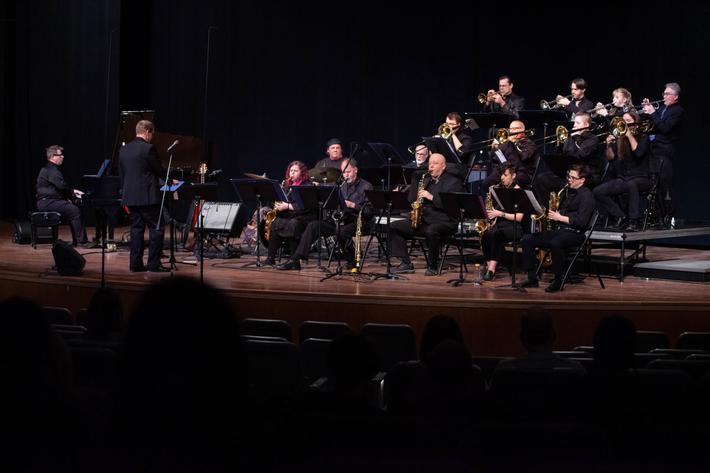
Springtime Jazz with NMC
Award-winning vibraphonist Jim Cooper has been playing the vibraphone for over 45 years and has performed with jazz artist... Read More >>
Dark Skies and Bright Stars
You may know Emmet County is home to Headlands International Dark Sky Park, where uninterrupted Lake Michigan shoreline is... Read More >>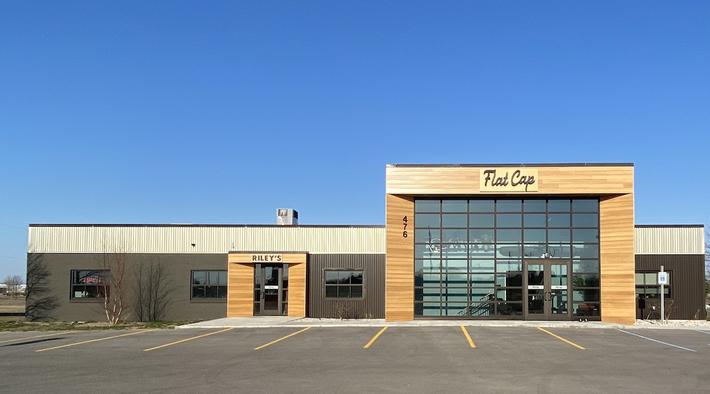
Community Impact Market
No need to drive through the orange barrels this weekend: Many of your favorite businesses from Traverse City’s majo... Read More >>


